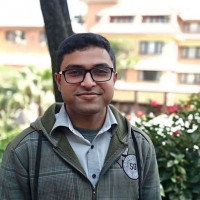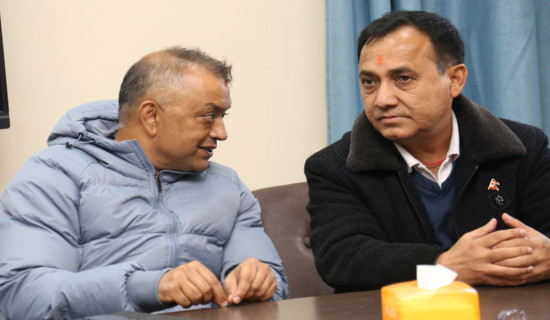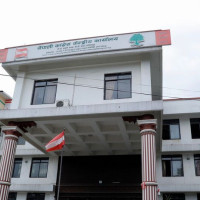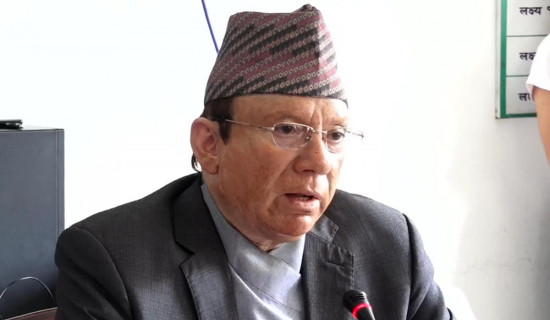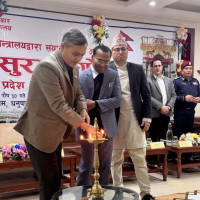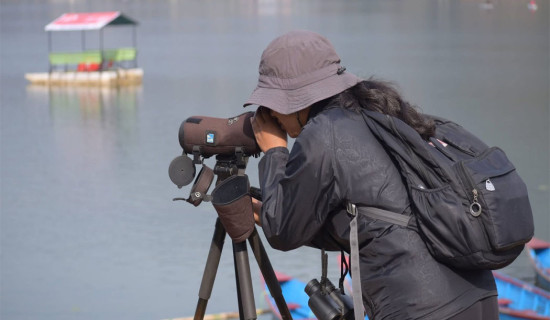- Wednesday, 14 January 2026
My Memorable Trip To Europe
As I stepped off the plane onto the tarmac at Brussels Airport, I found a gentle breeze there to greet me. It was a breeze like no other that carried whispers of a thousand stories and the promise of exceptional adventures. As I walked forward, I felt the warm embrace of the smell of warm waffles wafting through the air. The effervescent aroma of some of the world’s finest chocolate held my hand as I passed through immigration and only left after I and my fellow Nepali journalists, Tara Hamal Dhungana and Kalimaiya Kumari Chaudhary, met our guide, Carmine Carissimi.
Then, when I left the airport and boarded an articulated bus to the residence I and my two colleagues had been assigned, my soul finally made the realisation that my mind had been screaming for the past 20 minutes—I am in Belgium. And not just anywhere in Belgium. I was in Brussels.
This was my second trip to Europe. So, naturally, some things felt similar. The articulated bus, for instance, was the reliving of a familiar experience, and so were the omnipresent fizzy drinks. But many others felt excitingly new. Perhaps it was because of Brussels’ position as the bustling heart of not just Belgium but of the whole European Union (EU). Or perhaps it was because of the nature of my trip.
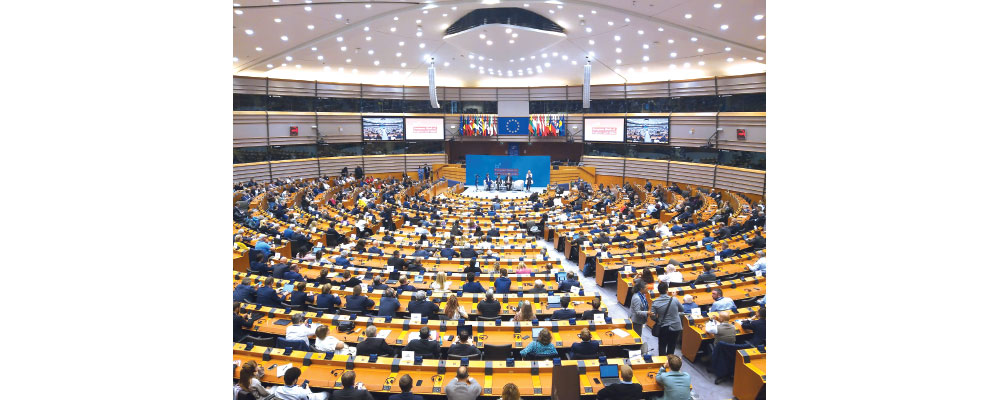
I was not in Brussels on an ordinary visit. It is still surreal to me that I was in the capital of Europe for an immersive learning experience and that I received an opportunity to delve into the inner workings of the European Union, one of the world’s most prominent and important political and economic alliances. As I walked the hallowed halls of EU institutions, got a glimpse into its working procedures and mechanisms, listened to officials and staff members, and explored the richness of the beautiful city that holds the beautiful names of Brussels in Flemish and Bruxelles in French, I found myself on a path of discovery, where every building, corner, and person offered something new to explore and understand. The European Union and its institutions are an intricate, albeit complex, tapestry that this scribe got to observe and absorb.
Context
On May 26, a friend of mine sent me a link. The link led me to the website of the Delegation of the European Union to Nepal, where they had issued a call for news covering human rights issues in Nepal. The winner, they said, would get to travel to Brussels to find out more about EU human rights policies and reporting and hold discussions with EU institutions.
It was a huge opportunity, and I felt I had news that met the requirements outlined in the call. But I did not have a shred of hope that I would get it. I had faith in my report, but I had more faith in the reports of others. Surely, people who have been in journalism longer than me and who have produced more impactful stories will apply and get it. But my friend encouraged me to apply. “It’s better to apply and not get it than to not and wonder if you would have got it. You have nothing to lose her,” she convinced me. Everyone needs a friend like her. Someone to talk you up, to bully your second thoughts away, and to motivate you to seize opportunity.
I applied, and two months later, on July 28, I received a call from the EU Delegation in Nepal. I had been selected. I was one of the three winners of the EU Human Rights Journalist Award for 2023 and got to visit Belgium from October 6 to October 14 as a part of it.
Human rights
With no intention of sounding insensitive or diminishing the continent’s past and present achievements, some of the worst things humans have done to one another have been done in Europe by Europeans. One need only look at the two world wars. It is perhaps because of that that the European Union today expresses a strong commitment to human rights. Hamal Dhungana, Chaudhary, and I had the opportunity to visit and learn about many European institutions, and everywhere we went, everyone we met reiterated that same commitment to human rights. The horrors of the past must not be repeated; this was the message we received. We also got to see just how much of a priority human rights and global development are for the EU.
Additionally, we got to see just what kind of mechanisms and apparatus are required to keep such a complex supranational entity as the European Union running. It was overwhelming, but in a good way.
Openness and efficiency
I have been to Europe twice now, and both times I have had the opportunity to visit houses of legislation. The first European legislature I visited was the Haus der Bürgerschaft in Bremen, Germany, and the second was the European Parliament on this visit to Brussels, Belgium. Both these times, I was awestruck by how open these institutions were. Tourists and civilians, after completing the necessary registration procedures, can enter the buildings, take pictures, and see how these lawmaking organ’s function. I can never remember a time when any part of our parliament was open to the public in any capacity. I hear that the citizens could once go inside Singha Durbar with relative ease. But those accounts might as well be fairytales now.
There may be legitimate security concerns. I do not have sufficient knowledge on the matter and do not seek to pass naïve comments. But there does seem to be room to do more to bridge the chasm we currently have between voters and the representatives they vote into office.
The efficiency the Europeans appear to have been also commendable. Turns out you can get the job done without submitting the same documents to five rooms in every government office, who knew? It took me all of two clicks to get my media accreditation at the European Parliament—one clicks to upload my photo and the other to upload my identity card. It took me more than two years to get my driver’s licence in Nepal. Again, the devil is in the details, and there may be many things I am missing here. But the entitled millennial in me wants to ask why seeking government services cannot be anything less than an ordeal for us in our country. *Insert grimacing face emoji*
Fluffy obsession
Belgian waffles are my new bae now. Their enticing aroma and delightful texture captured my heart and gripped my soul. These fluffy, crispy creations offer a perfect balance of taste and texture that will stay with me forever. Every piece of waffle I had ever had before this visit was a lie. Belgian waffles are the only true waffles. It was like tasting the elixir of the gods. I experienced perfection, and now I am cursed to forever live with the knowledge that nothing I will ever eat will match up to that richness.And I cannot even talk about the chocolates without breaking into tears. My god, the divinity. I never knew chocolate could taste so good.
What sets Belgian chocolates apart is their amazing presentation. They are not just a treat for the taste buds; they are also a feast for the eyes. The nation’s chocolatiers take great care in the presentation of their creations, with beautifully designed, handcrafted chocolate pieces that are more works of art than treats to eat. The exquisite packaging adds to the allure. I consider myself fortunate to taste them.
One thing that struck me as odd during my stay in Brussels is that people do not seem to use umbrellas. Even during heavy downpours, people, if they did not have raincoats, chose to get wet rather than get under an umbrella. Is this a peculiar Brussels thing, or is this not a thing at all, and I happened to only see the most umbrella-defiant people in the city? Perhaps not because our guide and interpreter, Saurav Ghimire, who had been in Belgium for a year when we visited, noticed the same thing.
So, if any Belgians are reading this, can you please tell us if we are mistaken, or do you have a beef with umbrellas?
On a more serious note, it was nice to learn about the success Nepalis have achieved in the country. Hamal Dhungana, Chaudhary, and I met H.E. Gahendra Rajbhandari, ambassador of Nepal to Belgium, the Netherlands, and Luxembourg and head of the Nepali Mission to the European Union, on October 11, and he told us that the Nepali community in Belgium, which is around 10,000 strong, has a strong presence in the restaurant business. Nepali passport holders and individuals of Nepali origin are responsible taxpayers who have created jobs in the country. This was a matter of immense pride for us.
Paris
On our second last day in Europe, the three of us visited the lovely city of Paris, France. A big thanks to Som Narayan Thanet, a Nepali living in Belgium, for being our guide from Brussels to Paris and for getting us back at a reasonable hour to be able to rest before our flight the next day.
Standing in front of the Eiffel Tower, I had to pinch myself to make sure this was not a dream. It was one of those things you do not know you crave until you get it.
Paris was not a city, but an experience. The experiences I obtained and the things I learned from this trip will truly stay with me for a lifetime, and I would be remiss if I did not thank the Delegation of the European Union to Nepal for giving me this opportunity. I also need to thank my colleagues and superiors at The Rising Nepal, the institution I work for, Gorkhapatra Corporation, and everyone who helped me produce the news story “Why can’t Kapalis have houses of their own?” that won me the EU Human Rights Journalist Award, but I feel that is best done in person. My maiden trip to the heart of Europe was memorable and fruitful.
(Mishra is a journalist at The Rising Nepal.)


